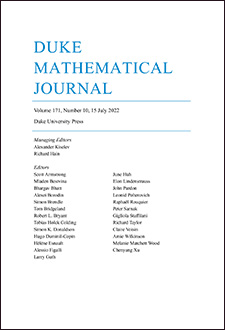Johannes Ebert, Oscar Randal-Williams
Duke Math. J. 171 (11), 2275-2406, (15 August 2022) DOI: 10.1215/00127094-2022-0023
KEYWORDS: positive scalar curvature, Gromov–Lawson surgery, cobordism categories, diffeomorphism groups, secondary index invariant, 19K56, 53C27, 55P47, 57R90, 58D17
We prove that many spaces of positive scalar curvature (psc) metrics have the homotopy type of infinite loop spaces. Our result in particular applies to the path component of the round metric inside if .
To achieve that goal, we study the cobordism category of manifolds with positive scalar curvature. Under suitable connectivity conditions, we can identify the homotopy fiber of the forgetful map from the psc cobordism category to the ordinary cobordism category with a delooping of spaces of psc metrics. This uses a version of Quillen’s Theorem B and instances of the Gromov–Lawson surgery theorem.
We extend some of the surgery arguments by Galatius and the second-named author to the psc setting to pass between different connectivity conditions. Segal’s theory of Γ-spaces is then used to construct the claimed infinite loop space structures.
The cobordism category viewpoint also illuminates the action of diffeomorphism groups on spaces of psc metrics. We show that under mild hypotheses on the manifold, the action map from the diffeomorphism group to the homotopy automorphisms of the spaces of psc metrics factors through the Madsen–Tillmann spectrum. This implies a strong rigidity theorem for the action map when the manifold has trivial rational Pontryagin classes.
A delooped version of the Atiyah–Singer index theorem proved by the first-named author is, moreover, used to show that the secondary index invariant to real K-theory is an infinite loop map. These ideas also give a new proof of the main result of our previous work with Botvinnik.

